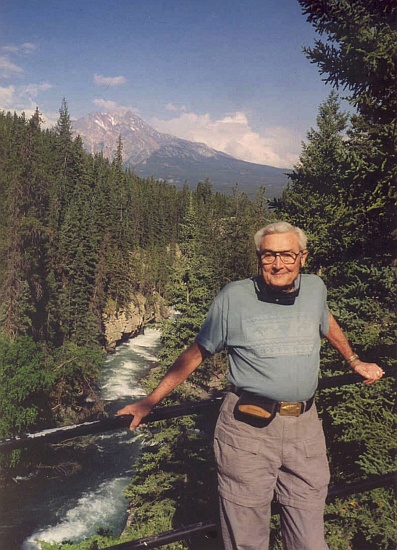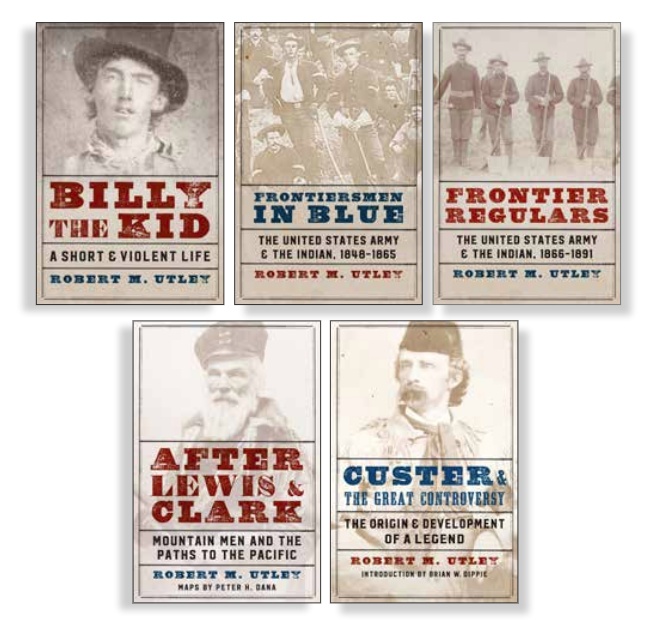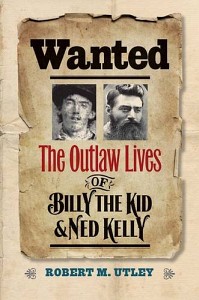


Bob died on June 7, 2022, in Scottsdale, Arizona, following complications from a simple surgery. You can read his self-authored and published obituaries. Biographical Video Shown at his Memorial Service The Complete Memorial Service |

|
Hi, friends!
You have reached Robert M. Utley,
a.k.a. The Old Bison. I assume most of you have
enough interest in me to access this web site. You
probably know of me as the author of many books and
other publications dealing with various aspects of the
American West. That I am, but as a historian for my entire career (I'm now in my nineties) I emerge from two traditions: addiction to writing about the history of the West, and a long-time career in the  National
Park Service, which I served as its chief historian
during one of the most critical periods in its history.
Even then I wrote books, and since retiring from the
federal government in 1980 I have devoted myself almost
entirely to writing books. I still consider myself a
proud veteran of the National Park Service and keep
current with its people and activities. The two
traditions were not separate. I kept one foot in both
traditions and another in academia and its various
professional offsprings. I am a product of all those
experiences. National
Park Service, which I served as its chief historian
during one of the most critical periods in its history.
Even then I wrote books, and since retiring from the
federal government in 1980 I have devoted myself almost
entirely to writing books. I still consider myself a
proud veteran of the National Park Service and keep
current with its people and activities. The two
traditions were not separate. I kept one foot in both
traditions and another in academia and its various
professional offsprings. I am a product of all those
experiences. |
For those who
wish to know more about me and these experiences,
consult my memoir, Custer
and Me: A Historian's Memoir particular
book, including my memoir, virtually all are still in
print and available under Robert M. Utley at www.amazon.com. particular
book, including my memoir, virtually all are still in
print and available under Robert M. Utley at www.amazon.com.
I now live in a retirement community in Scottsdale, Arizona, with my wife, Melody Webb. She's also a published author and a veteran of the National Park Service. In June 2015 I attended the annual meeting of the Western Writers of America in Lubbock, Texas. There I was inducted into the Western Writers of America Hall of Fame. I feel greatly honored. My 23rd book came out October 1st, 2020, The Last Sovereigns, Sitting Bull and the Resistance of the Free Lakotas. It deals with the last free Lakotas during the four years, 1877-81, they sought refuge in Canada, interacting with the North-West Mounted Police. Starvation drove them to surrender. You may e-mail me at old.bison@ymail.com. You can't call me because I am severely hearing impaired, though otherwise in fairly good health and, as you can see, I still write. |
| Now Available The Last Sovereigns  Sitting Bull and the Resistance of the Free Lakotas Available on Amazon The
Last Sovereigns is the story of how
Sioux chief Sitting Bull resisted the white
man’s ways as a last best hope for the
survival of an indigenous way of life on the
Great Plains--a nomadic life based on buffalo
and indigenous plants scattered across the
Sioux’s historical territories--that was
sacred to him and his people.
Robert M. Utley explores the final four years of Sitting Bull’s life of freedom, from 1877 to 1881. To escape American vengeance for his assumed role in the annihilation of Gen. George Armstrong Custer’s command at the Little Bighorn, Sitting Bull led his Hunkpapa following into Canada. There he and his people interacted with the North-West Mounted Police, in particular Maj. James M. Walsh. The Mounties welcomed the Lakota and permitted them to remain if they promised to abide by the laws and rules of Queen Victoria, the White Mother. But the Canadian government wanted the Indians to return to their homeland and the police made every effort to persuade them to leave. They were aided by the diminishing herds of buffalo on which the Indians relied for sustenance and by the aggressions of Canadian Native groups that also relied on the buffalo. Sitting Bull and his people endured hostility, tragedy, heartache, indecision, uncertainty, and starvation and responded with stubborn resistance to the loss of their freedom and way of life. In the end, starvation doomed their sovereignty. This is their story. Winner of the
2021 Spur Award
"In The Last Sovereigns the greatest biographer of the greatest Lakota leader delivers a superb account of Sitting Bull’s last years, centering on his exile in Canada. It is both a deeply human story of Sitting Bull’s friendship with a Canadian Mountie and an insightful history that puts Native resistance to conquest in an international context. A splendid read and a necessary book." T. J. Stiles, author of the Pulitzer Prize–winning Custer’s Trials: A Life on the Frontier of a New America "Robert Utley’s epic The Last Sovereigns is the heroic and heartbreaking saga of Sitting Bull’s desperate flight into Canada before his death in 1890. The backstory of how Maj. James Morrow Walsh of the North-West Mounted Police befriended the Lakota resistance leader is brilliantly rendered. Like all of Utley’s books, this is essential reading for anyone interested in the American West and Native American History. Highly recommended!" Douglas Brinkley, Katherine Tsanoff Brown Professor in Humanities and professor of history at Rice University and author of Wilderness Warrior: Theodore Roosevelt and the Land of America "With twenty-two acclaimed books over the last fifty-eight years, Robert M. Utley has established a reputation as the Dean of Western History. The Last Sovereigns adds luster to that well-deserved title with a masterful tale of cross-border intrigue and heroic resistance as Sitting Bull attempts to establish a new life for his people north of the ‘medicine line’ separating the United States from Canada. Utley’s fast-paced narrative, sharply delineated characters, and graceful prose make this a book that will appeal to all readers." Paul Andrew Hutton, Distinguished Professor of History at the University of New Mexico and author of The Apache Wars "Robert M. Utley reminds us why he is the dean of Western historians with this artfully crafted story of the consequential friendship between the great Lakota chief and a flamboyant North-West Mounted Police officer. Drawing on archival materials in Canada and the United States, Utley describes Sitting Bull’s determined, but ultimately futile, effort to maintain his freedom during the Lakotas’ four-year Canadian exile after their defeat of Lieutenant Colonel George Armstrong Custer at the Little Big Horn. While diplomats in Ottawa and Washington maneuvered to compel Sitting Bull’s return to the United States, NWMP Major James M. Walsh, whom Utley describes as “the only white man Sitting Bull ever trusted,” worked to protect and advise the Indians. Post trader Jean Louis Legaré stepped forward after the Canadian government sidelined the troublesome Walsh, feeding the starving Lakotas at his own expense and ultimately convincing Sitting Bull to give himself up at Fort Buford, Dakota. Nothing turned out well for any of the principals. Walsh ended his career in obscurity, Legaré was nearly bankrupted, and Sitting Bull died in a scuffle with Indian Police sent to arrest him during the Ghost Dance unrest. Utley revisits ground he covered in The Lance and the Shield, his acclaimed biography of Sitting Bull, but with deeper and more nuanced attention to the human drama behind the Lakota leader’s agonizing decision to surrender along with the last free Great Plains native people. An engrossing read from a master storyteller." Bruce J. Dinges |
| Available Now! Five Classics Reissued The historical works of Robert Utley read like well-spun novels. Don’t miss his bestselling classics, now featuring elegant new covers.  Available on Amazon |
| Available Now! The Commanders  Civil War Generals Who Shaped the American West A fresh evaluation of eight department commanders who served in the trans-Mississippi West Available on Amazon Taking
a novel approach to the military history of
the post-Civil War West, distinguished
historian Robert M. Utley examines the careers
of seven military leaders who served as major
generals for the Union in the Civil War, then
as brigadier generals in command of the U.S.
Army's western departments. By examining both
periods in their careers, Utley makes a unique
contribution in delineating these commanders'
strengths and weaknesses.
While some of the book's subjects--notably Generals George Crook and Nelson A. Miles--are well known, most are no longer widely remembered. Yet their actions were critical in the expansion of federal control in the West. The commanders effected the final subjugation of American Indian tribal groups, exercising direct oversight of troops in the field as they fought the wars that would bring Indians under direct military and government control. After introducing readers to postwar army doctrine, organization, and administration, Utley takes each general in turn, describing his background, personality, eccentricities, and command style and presenting the rudiments of the campaigns he prosecuted. Crook embodied the ideal field general, personally leading his troops in their operations, though with varying success. Christopher C. Augur and John Pope, in contrast, preferred to command from their desks in department headquarters, an approach that led both of them to victory on the battlefield. And Miles, while perhaps the frontier army's most detestable officer, was also its most successful in the field. Rounding out the book with an objective comparison of all eight generals' performance records, Utley offers keen insights into their influence on the U.S. military as an institution and on the development of the American West. "With his characteristic depth of knowledge and crisp, clear prose, Robert Utley provides a vivid group portrait of the Union generals who went west after the Civil War. A pleasure to read and an essential resource, The Commanders will take a prominent place on my bookshelf." T.J. Stiles, Pulitzer Prize winning author of Custer's Trials: A Life on the Frontier of a New America"Foremost western military historian Robert Utley turns his practiced eye to the frontier army's top brass--the generals commanding the departments responsible for the conduct of the Indian wars. Utley's critical examination of the brigadier generals who helped shape the American West concludes with a tough, unbiased ranking. His intriguing insights into the generals' abilities, character flaws, and overall performance may just surprise you." Andrew E. Masich, author of Civil War in the Southwest Borderlands, 1861-1867 "This book provides readers with a breadth that has not existed previously except in full biographies. Robert Utley's many decades of research and writing--virtually a lifetime devoted to history and historic preservation--further enhance the value of his conclusions." Jerry Greene, author of American Carnage: Wounded Knee, 1889 |
 Wanted The Outlaw Lives of Billy the Kid and Ned Kelly Now Available! at Amazon.com and other fine retailers The
oft-told exploits of Billy the Kid and Ned
Kelly survive vividly in the public
imaginations of their respective countries,
the United States and Australia. But the
outlaws' reputations are so weighted with
legend and myth, the truth of their lives has
become obscure. In this adventure-filled
double biography, Robert M. Utley reveals the
true stories and parallel courses of the two
notorious contemporaries who lived by the gun,
were executed while still in their twenties,
and remain compelling figures in the folklore
of their homelands.
"Robert M. Utley displays the gifts that have made him a storied interpreter of the nineteenth-century West. With all the crackling drama that defined Billy's and Ned's action-packed lives, he deftly illuminates each man's character and sets his life against the background of wider conflicts over money, power, and race. Utley shows how each was, in his own violent way, extraordinary." T.J. Stiles, author of The First Tycoon, winner of the Pulitzer Prize and the National Book Award "Robert N. Utley's Wanted is a marvelous dual biography of the most famous outlaws of their time. Even though the Kid hailed from New Mexico and Kelly from Australia, Utley ably draws distinctive parallels between their lives. A classic study for the ages." Douglas Brinkley, author of The Wilderness Warrior: Theodore Roosevelt and the Crusade for America "Brilliant idea! Billy the Kid and Ned Kelly didn't have a lot in common, but together they make one helluva book. What makes this 'comparison test' fascinating is that the author gives you the facts and leaves you to decide for yourself. I'm still working on it." Frederick Nolan. author of The West of Billy the Kid "Any book by the dean of western narrative historians is cause for celebration. Such is the case here. No one has written a book comparing one of the western demigods with a comparable legendary character from another culture. The achievement is one of a kind." Richard W. Etulain, author of The Life and Legends of Calamity Jane "Can a people be defined by the iconic outlaws they embrace? Historian Robert M. Utley tackles that question and many others in this enlightening comparison of the two most famous bad boys produced by the former British colonies of the United States and Australia. Utley, as usual, brings the past to life with graceful prose and powerful insights." Paul Andrew Hutton, Distinguished Professor, University of New Mexico |


